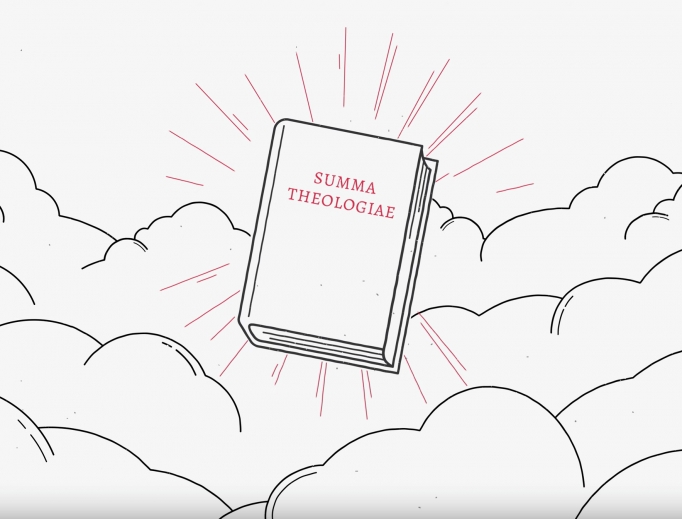‘Aquinas 101’ Teaches College Students, Others Thomistic Philosophy
The Thomistic Institute free course introduces who St. Thomas Aquinas was, explains the basic concepts of his philosophy, and outlines his masterpiece, the Summa Theologiae.

Not everyone has ready access to top Dominican scholars to explain St. Thomas Aquinas to them.
Well, at least not until this September, when the Thomistic Institute launched “Aquinas 101,” a free course consisting of 85 to 90 short videos that introduce who St. Thomas Aquinas was, explain the basic concepts of his philosophy, and outline his masterpiece, the Summa Theologiae.


The Thomistic Institute, which is based out of the Dominican House of Studies in Washington, D.C., started forming campus chapters at secular colleges three years ago, growing from four campuses in 2016 to 45 this year. At the centerpiece of the institute’s activities on campus are the lectures that it sponsors, bringing the Thomistic tradition to bear on a wide range of issues, from neuroscience and the existence of the soul to the theological implications of the search for intelligent life.
“We’ve found that students are incredibly hungry for the truth, and no one is telling them about their own great intellectual heritage,” said Dominican Father Dominic Legge, the director of the Thomistic Institute.
But the Dominicans have heard from students who tell them they want to go deeper.
“Students frequently ask us where they can find a good introduction to the thought of St. Thomas, so that they can start reading him themselves,” Father Legge said. “That is why we created Aquinas 101. We wanted to make something that would introduce Aquinas’ thought in a systematic way, easy to understand, while at the same time communicating the philosophical and theological depth of Aquinas’ thought and giving some sense of the power of his thought for understanding contemporary questions.”
The free videos range from three to eight minutes. The list of presenters includes Father Legge, Dominican Father Thomas Joseph White, a widely published Thomistic scholar, Dominican Father James Brent, a member of the pontifical faculty of the Immaculate Conception at the Dominican House of Studies, and Dominican Father Thomas Petri, the vice president and dean of the pontifical faculty.
The target audience is young college students, but anyone can sign up, ranging from high-school teachers looking for supplemental course material to retirees who have more time to learn about their faith, according to Dominican Father Gregory Pine, the project manager, who is also one of the video presenters. As of Oct. 3, the institute had 18,000 enrollees in Aquinas 101 from schools across the country.
Students who sign up online will receive two videos via email each week, along with supplementary podcasts and articles. There is no deadline to register. Those who enroll later will simply finish the program that much later. Those who want to binge watch the videos without waiting for the emails can visit the Thomistic Institute’s YouTube page. About 10 of the videos are currently up.
Aquinas 101’s short videos are perfectly designed to fit into the busy college student’s schedule, but some students are going the extra mile. Students in the Thomistic Institute’s chapter at the University of California, Berkeley meet on Monday evenings, watch the videos as a group, and read the supplementary articles, which include excerpts from Aquinas’ writings.
“The videos provide a very good introduction to Aquinas’ philosophy and theology for those with little to no background,” said Braxton Silva, a senior who is the president of the UC Berkeley chapter of the Thomistic Institute.
“It’s been wonderful being able to explore the teaching of Aquinas with a group. The group discussion really helps us engage with and critically evaluate the teachings of Aquinas. Aquinas’ teachings aren’t just a relic from the past, but perennial wisdom that even now (especially now!) has relevance to our lives,” Silva said.
Silva, who is a double major in mathematics and linguistics, said one of the biggest insights has been Aquinas’ insistence on the unity of truth. Rather than being in conflict with each other, the different “sciences,” or systems of knowledges, are “all different ways of looking at the one Truth of the world,” Silva said.
But it’s not just students on secular campuses who are benefitting. Grace Brizek, a junior at The Catholic University of America, is also among those who have signed up.
Brizek encountered Aquinas in entry-level courses but they “barely touched on his work” because they covered a range of philosophers and theologians. “After freshman year, classes that are not specifically about him will usually skim Aquinas because we’ve already talked a lot about him as freshmen, and there are a lot of philosophers we need to cover,” Brizek said.
Because Brizek is majoring in vocal performance, she doesn’t have a chance to take more philosophy courses. “After my first year, I missed writing philosophy papers, arguing with my professor, or struggling to figure out what my assigned reading meant,” Brizek said. “I signed up for Aquinas 101 with the hope that it would further my intellectual cultivation, that it would be the new outlet for my drive to learn and think critically.”
So far, the course hasn’t disappointed. She described the videos as “both enjoyable and genuinely edifying.” She says the material is presented in easy-to-understand language that allows her to probe and mull over the core concepts being taught.
One of the pleasant surprises has been getting to know St. Thomas Aquinas himself, Brizek said. Contrary to the stereotype of Aquinas as a “stoic academic unrelatable to us,” Brizek said she could relate to his passion for thinking.
“Of course it’s wonderful to discover that this old philosopher is not so different from me personally, but reflecting upon this similarity brought a deeper truth to fruition: He isn’t just similar to me; he’s similar to all of us,” Brizek said. “Everyone has some curiosity, some desire to know more, some urge to question and analyze; he just actually acted upon this desire and turned out to be extremely good at doing so.”
Brizek’s experience is what the Dominicans hope other students take away from the course. Father Pine said that through the videos students learn that Aquinas isn’t an “an intellectual for intellectuals.”
“What he teaches, what he proposes is a perennial philosophy,” Father Pine said. “So it’s constantly recurring precisely because you know human nature endures from age to age, and we’re always ordered to the truth. St. Thomas is an excellent and wise guide — an excellent and wise teacher who helps us engage well with the truth.”
“Wisdom and its pursuit are not exclusively for academics—they’re for everyone, and we should not neglect the remarkable, necessary faculty of human understanding simply because we need help cultivating it,” Brizek said.
The ultimate goal, according to Father Pine, is to engender a greater knowledge and love of God. He said Aquinas helps the faithful grow closer to God by teaching the necessary “habits of mind and heart.” In other words, he said Aquinas enriches our prayer and study so that we “become better contemplatives.”
Stephen Beale writes from Providence, Rhode Island.















